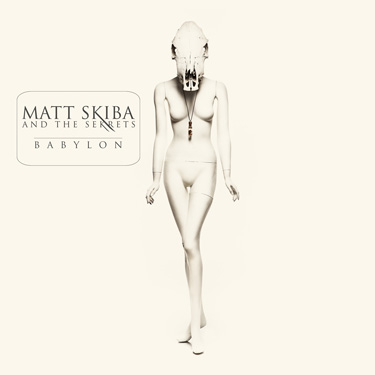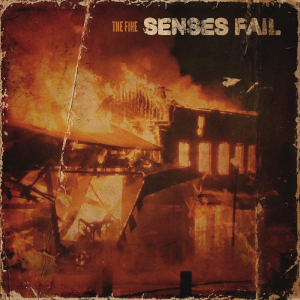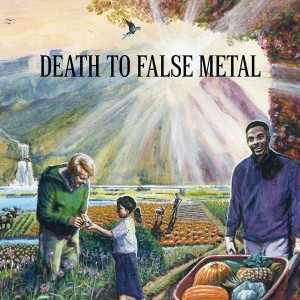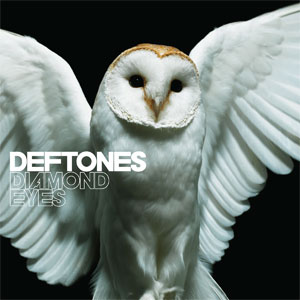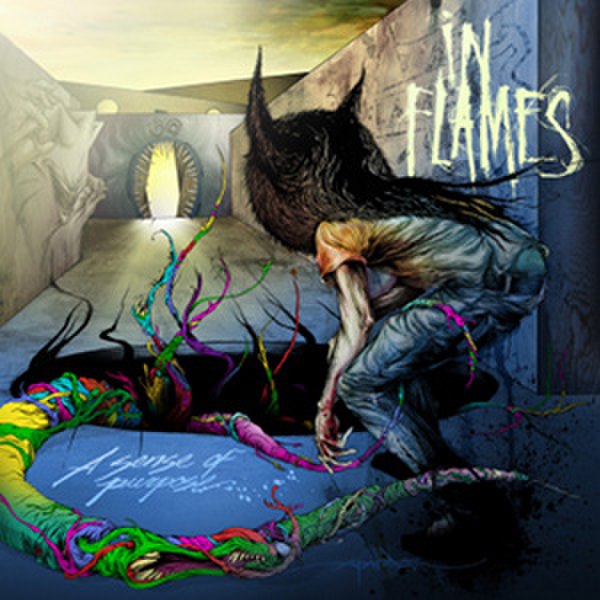And now, without further adieu…
 Best Release of 2011: No Devolución by Thursday (*****)
Best Release of 2011: No Devolución by Thursday (*****)Complete albums, ones that make a specific statement in mood and execution, are hard to come by. That said, Thursday’s No Devolución is perhaps the MOST complete album of 2011. Here, the New Jersey five-piece is at their most inventive, merging shimmering post-rock flourishes and icy keyboards with their already visceral, car-crash style guitarwork. The frostbitten synthesizer stabs and twisting guitar chime of “No Answers” displays a group that’s interested in sculpting the space around them. Elsewhere, the oozing bass driven dirge of “A Darker Forest” shows they’re unafraid explore heavy overtones without always pushing their instruments into the red. Yet the storm-like atmosphere might be the most engaging part of No Devolución, for Thursday effortlessly shifts from bludgeoning, angular dissonance (“Past & Future Ruins”) to glistening reverb soaked heights (“Magnets Caught In The Metal Heart”). Through it all, Geoff Rickley’s dream-like explorations of intimacy and devotion ties it together, throwing his personal struggles against this musical maelstrom. While his prose is more abstract than past Thursday offerings, Rickley explores the tightrope we all walk in search of authenticity, acceptance, and ultimately, love. This conceptually coalesces in the swirling, white noise dénouement of “Stay True” where Rickely ultimately reveals that devotion is only real if we ourselves remain true about our desires and dreams. Discovering this sort of truth has lead the group calling it quits after 14 years, but even still, it’s breathtaking to see a band follow their instincts, conviction, and hearts to create a modern masterpiece. If this is the last time we hear Thursday, at least we’ll know they went out following their vision with an incredible swan song in No Devolución. Key Cuts: No Answers, A Darker Forest, Past & Future Ruins
 Best Debut: Yuck by Yuck (****½)
Best Debut: Yuck by Yuck (****½)Someday, the 90s will be remembered liked the 60s: As a hot bed of musical creativity both in sound and aesthetic. Until then, however, we’ll have to settle for a handful of groups that understand that while the critics and the mainstream calls it “retro.” Yuck is one such band invested the sonic freedom that the 90s fostered (even if it’s 2011), and they used their exciting blend of Archers Of Loaf fuzz-pop and Smashing Pumpkins style emoting to create the year’s most exciting debut. The group’s self-titled album starts with the reckless crunch and wail of “Get Away,” while “Shook Down” incorporates pillowy vocals and drifting acoustics before the feedback-wrapped solo knocks it into the stratosphere. Yuck doesn’t stop there; “Suicide Policeman” falls somewhere in between the quaintness of The Kinks or The Beatles if Butch Vig got them signed to Sub Pop. But by and large, the album’s real standout is the slow-motion ballad “Stutter,” where Daniel Blumberg’s dreamy vocals make time stop over trailing guitar lines and heartbeat bass work. Part of the charm of these old 90s groups was their knack for finding a way to make the most intimate moments seem like lifetimes, and whether you listen to Yuck with nostalgia or critical curiosity they’ve certainly accomplished that here. Key Cuts: Shook Down, Suicide Policeman, Stutter
 Best Rock Release: Belong by The Pains Of Being Pure At Heart (****½)
Best Rock Release: Belong by The Pains Of Being Pure At Heart (****½)How do you make your charming indie debut seem like a demo tape cut in your Mom’s basement? You write a blissfully transcendent record while hiring Flood and Alan Moulder to add some much needed punch to the mix. For The Pains Of Being Pure At Heart this resulted in Belong, a 10-track journey through shoegaze, twee pop and everything else in between. The album’s title song starts things off with a blitzkrieg of space-like riffs that would make Billy Corgan blush, while the 80s-inspired synthesizers on “Heart In Your Heartbreak” display the group’s ability to balance texture with swirling, kaleidoscopic guitars. Aside from its obvious genre cues though, the thing that makes Belong sparkle is its intimacy, both in sound and in subject matter. Kip Berman spends a lot of time using his soft, androgynous voice to explore the moments where relationships fall apart or when the realities of impermanence catch up to us. On the hazy, haunting power-pop thump of “Even In Dreams,” Berman examines the ideal of boundless loyalty, existing in a place we could only imagine. Like the best rock albums, Belong catapults listeners into a place where mood becomes paramount to rationality, giving us impressions of feelings all too familiar, yet larger than who we are. At the end of the day, this accounts for very little growing pains for The Pains Of Being Pure At Heart, as they've created a record that displays natural maturity while keying in on the hurt that happens when we all grow up. Key Cuts: Belong, Heart In Your Heartbreak, Even In Dreams
 Best Punk/Post-Hardcore Release: Parting The Sea Between The Brightness & Me by Touché Amoré (*****)
Best Punk/Post-Hardcore Release: Parting The Sea Between The Brightness & Me by Touché Amoré (*****)Urgency has always been the hallmark of great punk rock. Today, this is doubly true to separate the spectacular from the mundane; groups are playing louder, vocalists are harsher, and with the democratization of recording technology everyone can have an “authentic” sounding record. Yet listening to Touché Amoré’s sophomore album, you get the sense that urgency may still be alive and well, even if it’s simply relegated to the underground. Clocking in at around 20 minutes, Parting The Sea Between Brightness & Me is the most important punk record this year. Clayton Stevens and Nick Steinhardt smash each other’s guitars together like crashing waves, while Tyler Kirby’s sliding bass hits like a low-end battering ram. “The Great Repetition” is a driving, sonic tailspin of claustrophobia, while “Art Official” benefits from slam-and-release style distortion. Though things slow down on the funeral-style piano ballad “Condolences,” don’t think it’s the token sensitive track on the record. Everything on Parting… has been constructed to be immediate and raw; the group recorded this album live in the studio, drummer Elliot Babin’s brash beats stop/start on a dime, and NONE of the tracks clock in over 2:21. In short, Touché Amoré aren’t interested in distractions, they're interested in what’s real, both lyrically and in execution. On “~,” Jeremey Bolm’s sandpaper shouts layout the group’s musical manifesto, set against adrenaline rush riffs and shimmering vistas, “If actions speak louder than words/I'm the most deafening noise you've heard…” Key Cuts: ~, The Great Repetition, Art Official
 Best Metal Release: Time Is Up by Havok (****½)
Best Metal Release: Time Is Up by Havok (****½)Contrary to what every 13-year old with an Internet connection believes, metal music doesn’t succeed solely on how fast or how LOUD the musicians might be. A great metal record creates mood, a level of energy that gets your blood pumping and head banging. Here’s where Havok comes in, because with Time Is Up, they’ve fashioned an exciting metal record that focuses on something crucial: Atmosphere. Of course the riffs here are mean fighter pilots of palm-muted crunch, especially like on the blistering opening of “Prepare For Attack,” but amidst the plethora of laser dive bombs and pick slides they’re able to establish some infectious grooves that add heaviness without blowing out your ear canal. The entire disc falls firmly in between the Metallica/Megadeth school of 80s thrash, but Havok isn’t afraid to shift time signatures with purpose, which ultimately avoids the current ADD-style riffing that needlessly complicates modern metal. “Killing Tendencies” begins with a fat, low-end march, before exploding into a frenzied onslaught, while “D.O.A.” sports an honest to goodness spider-riff that would make Dave Mustaine tear up inside. Though Jesse de los Santos’ vocal range may only cover a howl-to-shriek type of delivery, the thing that really gives Time Is Up its teeth and its staying power its sense of melody. The solos here twist and flurry with the best axe men, but they suit the arrangements rather than being a flavorless grab bag of self-indulgence. Indeed, Havok have delivered something special here, reminding us that sometimes composition and tension are just as important as rocking the hell out. Key Cuts: Prepare For Attack, D.O.A., Killing Tendencies
 Best Electronic Release: The Girl With The Dragon Tattoo OST by Trent Reznor & Atticus Ross (****½)
Best Electronic Release: The Girl With The Dragon Tattoo OST by Trent Reznor & Atticus Ross (****½)Let’s get the obvious out of the way: Trent Reznor and Atticus Ross’ kinetic, clamorous cover of “Immigrant Song (Feat Karen O.)” is as sexy and sleek as it is gothically inclined. Moreover, the layered, slow-burn drift of “Is Your Love Strong Enough?” (Featuring How To Destroy Angels) provides another haunting bookend for The Girl With The Dragon Tattoo OST. But where this three-disc collection of music really ascends is in Reznor and Ross’ continued drive to retain their signature voice while expanding their sonic palate. Decidedly less glitchy than The Social Network OST, Girl… finds Reznor residing on the softer end of the spectrum, while creating menacing and tense soundscapes. Synthesizers swirl and moan all over Girl…, casting shadows over these creeping, slinking arrangements. Rumbling bass work often gives the sense of impending dread, while organic percussion is looped and warped to shimmer and hum, creating an ominous instrumental fog. Additionally, white noise freak-outs are at a premium on Girl…, allowing Reznor and Ross to display their touch for the delicate without coming across as too ballady. On “What If We Could?” listeners are treated weighty piano while tense electronics create a wailing haze against twinkling xylophones. While it probably adds another layer of weight to David Fincher’s new film, Reznor and Ross should be proud of what they’ve accomplished here, once again proving how innovative their creative chemistry is to electronic music. Key Cuts: Immigrant Song (Feat. Karen O), What If We Could?, The Heretics
 Best Produced Release: Codes & Keys by Death Cab For Cutie (****½)
Best Produced Release: Codes & Keys by Death Cab For Cutie (****½)The more Chris Walla takes up the producer credit on albums, the more impressive his ear and his skills behind the boards seem. With Death Cab For Cutie’s latest offering, Walla helps Ben Gibbard and Co. blend soft keyboards and programmed drums with an organic, live-in-the-room sound. Most of the time, Codes & Keys comes across like a vintage photograph, evoking vivid/arresting moods while seeming distanced from the harshness often displayed in modern production. It's a special kind of feeling on Codes & Keys, soft but clear. Though the album’s title track is a lumbering mix of stompy piano and soothing strings, cuts like the robotic hum of “Unobstructed Views,” or the buzzed out, zippy “Monday Morning” feel effortlessly spacious, and warmer than their keyboard-centric instrumentation would lead you to believe. Gibbard’s surprisingly self-assured song craft is in fine form here, but Codes & Keys largely succeeds because of how in balance everyone’s instruments are. Each player’s contributions are highlighted within Walla’s pristine mix, whether it’s Gibbard’s soaring guitar lines on “You Are A Tourist,” or Nick Harmer’s decisive bass work on the echo-soaked “Some Boys.” Yet ultimately, Walla’s touch grants some crisp cohesion to an album that could have just as easily gone off the sonic railroad track. Amidst soaring strings, snappy cymbal sequencing, and syrupy guitar lines, Walla allows all of his band mates to shine on Codes & Keys, a feat only a deft producer could display as effortless. Key Cuts: Codes & Keys, You Are A Tourist, Monday Morning
 Best Comeback Release: Neighborhoods by blink-182 (****½)
Best Comeback Release: Neighborhoods by blink-182 (****½)From plane crashes to Grammy announcements, the story of blink-182’s storied reunion has been plastered all over then Internet and then some. The biggest question after the hatchets were all buried though, was could this trio recapture the promising potential they displayed on 2003’s (untitled)? The short answer is Yes: Neighborhoods adds some beefed-up punk punch to the group’s continued preoccupation with 80s style synthesizers, trailing delay effects, and the tried and true dual vocals of Tom DeLonge and Mark Hoppus. Look no further than the album’s opening number: “Ghost On The Dance Floor” features Travis Barker’s thunderous drumming, shining/technicolor snyths, twitchy guitar lines, and climbing bass work before it all explodes into a raucous, flange soaked bridge. Though the group opted to self-produce given the passing of long-time “fourth member” Jerry Finn, they seem a lot more comfortable melding their divergent musical interests without an outside influence. From the ascending, star-struck buzz of “Up All Night” to the downstroked frenzy of “Heart’s All Gone,” Neighborhoods might be the most diverse blink record yet, even if the production errs on the dry side. Lyrically, Neighborhoods keys in on the decay of youth and old haunts, which seems apt given the trials and tragedy surrounding blink’s reunion. Whether it’s the broken relationships immortalized on the high-hat heavy “After Midnight” or the twisting, Cure-flavored sexual tension of “Snake Charmer,” Neighborhoods finds blink-182 looking within while sticking to their adventurous sonic instincts. Welcome back guys, it’s been a long 8 years. Key Cuts: Ghost On The Dance Floor, Up All Night, Snake Charmer
 Best E.P.: ††† by ††† (*****)
Best E.P.: ††† by ††† (*****)While the Deftones had a smash album last year, leave it to lead singer Chino Moreno to get antsy on the road. Much like his 90s electronic side project Team Sleep, ††† (pronounced “Crosses”) has allowed Chino to scratch that creative itch while exploring yet another huge electronic trend: Witch House. Yet unlike Salem, oOoOO, or any other variant of typographically challenged acts, ††† is a shining example if what the genre can yield rather than an exercise in tired beat making and pitch-distorted vocals. Things get witchy pretty quickly on this E.P., whether it’s the snappy clatter and keyboard shower of “Op†ion” or the phantasmal shine of “†hholyghs†.” While considerably lighter on gothic flourishes in relation to other witch house contemporaries, Moreno makes up for that with his often breathy, desperate, and hungry croon. ††† as a whole does a great job of continuing to showcase how gifted a vocalist he is, especially on the midnight séance come-on of “Bermuda Locke†.” But ultimately, what separates this fabulous E.P. from the deluge of lesser bands it’s grouped with is Moreno’s sense of grandeur. With a little bit of financial means to back this vanity project, ††† never sounds like it was recorded on a janky four-track, and the large cathartic swells here seem bigger, brighter, and more powerful then one might expect from this genre. On the closing, middle-eastern tinged “†,” Moreno’s project sounds simultaneously dream-like and cultish, the perfect musical storm for this supernatural take on electronic music. Key Cuts: Op†ion, Bermuda Locke†, †
 Most Ambitious: Bon Iver, Bon Iver by Bon Iver (***½)
Most Ambitious: Bon Iver, Bon Iver by Bon Iver (***½)Justin Vernon couldn’t go back to crafting ramshackle acoustic numbers after collaborating with everyone from Kanye West to Gayngs in 2010. When you fly that close to the sun, the expectation is that you’ll shine brighter, and Vernon has done everything to make Bon Iver, Bon Iver into a vivid work of art. If For Emma, Forever Ago was the sound of a man’s heartache secluded in a winter cabin, Bon Iver’s follow up is the thaw afterwards, with percussion that sounds like babbling brooks, keyboards that rise like the sun, and an infusion of horns and electric guitars to sculpt dreamy soundscapes. Vernon takes sonic cues from icons like Peter Gabriel and Phil Collins, all in an effort to make his record feel like expansive place, almost like its Thomas Kinkade-style cover alludes to. From the smoky guitar ring of “Perth” to the sighing keyboards on “Calgary,” Vernon marries slick instrumentation with soft atmospheres to give these songs a quiet sense of tranquility. Arrangements weave and bend here, rather than rattle and creak, and the warmth suits Bon Iver even if it’s a bit distracting at first blush. While this push towards a brighter, fuller sound can sometimes get him into trouble (The horn heaving “Beth/Rest” comes to mind) it’s commendable to see an artist, so lauded for his simplicity, stepping into something that requires a bit more meticulousness in terms of composition. On “Holocene” Vernon’s whisper-honey voice chimes “And at once I knew, I was not magnificent…” over finger picked tension, but don’t buy it, it’s a sly misdirect. Even with its imperfections, it’s hard to deny the pristine glimmer of Bon Iver, Bon Iver. Key Cuts: Perth, Holocene, Calgary
 Most Experimental: The King Of Limbs by Radiohead (*****)
Most Experimental: The King Of Limbs by Radiohead (*****)Though it might not be entirely shocking that The King Of Limbs is unlike any other Radiohead album before it, it still stands to reason that Thom Yorke and the gang continue to twist our conception of music with every successful release they put out. Not only that, but they make it seem effortless. Borrowing everything from free-jazz to dubstep glitches, woodsy folk, and weightless space-rock, Radiohead’s latest release might be their most genre-bending batch yet. Whether it’s the sultry clatter and groove of “Lotus Flower” or the misty, echo-soaked acoustics of “Give Up The Ghost,” Radiohead seem more insistent to challenge their listeners (and themselves) more than ever before. Yet despite the increased level of programmed drums and laptop buzz, there’s something about The King Of Limbs that feels organic and secluded, a hidden sort of beauty that only reveals itself after repeated listens to these sometimes fractured songs. “Bloom” unfolds with swelling horns, thick beats, and Charles Minus swagger, while the piano dirge and sole French Horn call of “Codex” is blissfully mesmerizing. Though if there’s one constant in the land of Radiohead, it’s Yorke’s continually ethereal voice, balancing a wistful tenor with a darkly sexy coo. He shifts from confrontational (“Morning Mr. Magpie”) to immersive (“Separator”) with a master’s touch, often contributing the most arresting moments on the LP. While it may only be 8 songs long, The King Of Limbs is a confident display of restraint and experimentation, a labor of love from the most forward thinking group in modern music today. Key Cuts: Lotus Flower, Codex, Separator
 Most Eclectic: Hot Sauce Committee Part Two by The Beastie Boys (*****)
Most Eclectic: Hot Sauce Committee Part Two by The Beastie Boys (*****)One of the most exciting aspects of hip-hop has always been the cut-and-paste hodgepodge of sounds that producers and DJs string together for MCs. There’s a beautiful sense of diversity/ingenuity that comes from mining those found sounds, proliferating the craft of turn tabling as well as allowing the music itself to be aesthetically accessible to just about anyone. Championing this in the 80s (and making a nearly 3 decade career out of it), The Beastie Boys reminded us in 2011 just how much fun that kind of music making could be with Hot Sauce Committee Part Two. There’s thick, overblown bass, chunky reggae rhythms, spaztic jazz passages, punk rock whirlwinds, and a song called “Funky Donkey” for goodness sakes. While the deceptively youthful Mike D., AD Rock, and MCA keep their dynamic tag team rhymes intact, it’s the instrumentation that takes precedent on Hot Sauce... From the metallic clang and slide of “Nonstop Disco Powerpack” to the mammoth-sized beats and synthesizer pulse of “Long Burn The Fire,” the Beasties work like musical mad-scientists. No sound is too strange, no instrument or aesthetic too far-out to pair with their absurdist bravado. “Lee Majors Come” again features rhymes about the 6 Million-Dollar Man, set against dirty bass work and twitchy record scratches, while the speaker blasting fuzz of “Too Many Rappers (New Reactionaries Version)” feels gargantuan. There are guest spots of course; everyone from Santigold to Nas, but the real feat here is how the Beasties still make their “everything-and-the-kitchen-sink” approach to hip-hop work, especially after 30+ years in the business. With cuts this good, we can only imagine what Part One might be like. Key Cuts: Nonstop Disco Powerpack, Long Burn The Fire, Lee Majors Come Again
 Most Crapped On: Lulu by Lou Reed & Metallica (***)
Most Crapped On: Lulu by Lou Reed & Metallica (***)For reasons other than the hype and pretension surrounding its overblown release, Lulu is an easy record to hate. It’s needlessly long, dangerously monotonous, and to top it off, Lou Reed sounds like a homeless Allen Ginsberg at the depths of a heroine binge. HOWEVER, if you can forgive all of the above (Which believe me, is a TALL order), you may actually find something to appreciate on this two-disc monster. This is mostly because in the midst of Reed’s self-indulgent homage to a set of German plays exploring sexuality and violence, Metallica actually strings together some interesting arrangements, even exploring texture and mood in addition to their usual savage thrash metal. While “The View” has been ridiculed for James Hetfield’s rough proclamation of being a table, the song’s main riff is doom-inspiring and Sabbath-esque, before crumbling into a chugging bridge and Kirk Hammett’s splattering lead work. It doesn’t stop there: “Pumping Blood” alternates from clean passages to “Leper Messiah” style crunch, while “Mistress Dread” cuts faster than some of the group’s work on Kill ‘Em All, possibly for twice the length. Elsewhere, the menacing heave and plod of “Iced Honey” recalls RELoad’s biker metal cool, proving that with all the problems surrounding Lulu’s execution and conception, Metallica aren’t an overwhelming part of that. Still, it’s sort of a shame to feel like this star-studded album is simply a rough draft, especially when Reed’s dried-up croak makes an interesting collaboration into painfully average one. Key Cuts: Pumping Blood, Mistress Dread, Iced Honey
 Biggest Surprise(s): Camp by Childish Gambino (****)/No Kings by Doomtree (****½)
Biggest Surprise(s): Camp by Childish Gambino (****)/No Kings by Doomtree (****½) I had to pair these next two records together because I think with their DIY aesthetic and hunger they BOTH hit me in the exact same way. Additionally, they’re both from underground artists that have been honing their craft for a while now; ones who are just now starting to see their discipline pay off. With Camp, Donald Glover (a.k.a. Childish Gambino) has put his pop-culture machine gun of a mouth to good use, spinning tales of his awkward upbringing, while undermining the hyper masculine bravado still prevalent in hip-hop. Over an expansive mix of genres, Glover hits on just about area sonic area imaginable, whether it’s 90s R&B glide of “Fire Fly” or the slash and burn fuzz of “Bonfire.” The real gem, however, is “Backpackers,” where Glover’s Hans Zimmer-meets-Kanye West clatter provides the backbone for him to call out his contemporaries with masterful precision. Given his tenure in the television world (30 Rock, Community), Glover has a comedian’s sense of timing that truly elevates his delivery on Camp, displaying a sense of timing that other rappers would cut their arms off for. Elsewhere, No Kings by Doomtree takes a slightly different approach: While this Minneapolis rap collective has spawned some great individual artists (P.O.S, Dessa) No Kings is the first time the group exudes confidence, both in their music and in their message. Whether it’s the barracuda bass line of “No Way” or the aching blues shuffle of “Little Mercy,” Doomtree are able to marry the punk spirit of rebellion with the gritty realism found in hip-hop. The music here goes for the jugular: “Bangarang” features a shower of dizzying synthesizers, while cuts like “Bolt Cutter” and “Gimme The Go” relish in chip tune dissonance and expressive electronics. Yet what sets No Kings apart is the fact that it’s a call to arms; addressing everything from the Occupy movement to racial inequity and social justice, No Kings is the kind of record that pushes people to see how the sausage is made, and whether or not it’s worth the price. That said, the only question left to answer is with hip-hop records like Camp and No Kings, who needs Drake? Key Cuts from Camp: Fire Fly, Bonfire, Backpackers / Key Cuts from No Kings: No Way, Bangarang, Little Mercy
I had to pair these next two records together because I think with their DIY aesthetic and hunger they BOTH hit me in the exact same way. Additionally, they’re both from underground artists that have been honing their craft for a while now; ones who are just now starting to see their discipline pay off. With Camp, Donald Glover (a.k.a. Childish Gambino) has put his pop-culture machine gun of a mouth to good use, spinning tales of his awkward upbringing, while undermining the hyper masculine bravado still prevalent in hip-hop. Over an expansive mix of genres, Glover hits on just about area sonic area imaginable, whether it’s 90s R&B glide of “Fire Fly” or the slash and burn fuzz of “Bonfire.” The real gem, however, is “Backpackers,” where Glover’s Hans Zimmer-meets-Kanye West clatter provides the backbone for him to call out his contemporaries with masterful precision. Given his tenure in the television world (30 Rock, Community), Glover has a comedian’s sense of timing that truly elevates his delivery on Camp, displaying a sense of timing that other rappers would cut their arms off for. Elsewhere, No Kings by Doomtree takes a slightly different approach: While this Minneapolis rap collective has spawned some great individual artists (P.O.S, Dessa) No Kings is the first time the group exudes confidence, both in their music and in their message. Whether it’s the barracuda bass line of “No Way” or the aching blues shuffle of “Little Mercy,” Doomtree are able to marry the punk spirit of rebellion with the gritty realism found in hip-hop. The music here goes for the jugular: “Bangarang” features a shower of dizzying synthesizers, while cuts like “Bolt Cutter” and “Gimme The Go” relish in chip tune dissonance and expressive electronics. Yet what sets No Kings apart is the fact that it’s a call to arms; addressing everything from the Occupy movement to racial inequity and social justice, No Kings is the kind of record that pushes people to see how the sausage is made, and whether or not it’s worth the price. That said, the only question left to answer is with hip-hop records like Camp and No Kings, who needs Drake? Key Cuts from Camp: Fire Fly, Bonfire, Backpackers / Key Cuts from No Kings: No Way, Bangarang, Little Mercy Biggest Letdown: Major/Minor by Thrice (**½)
Biggest Letdown: Major/Minor by Thrice (**½)Though the bar may have been set to astronomical heights following Thrice’s sonically adventurous The Alchemy Index and the crystalline slow-burn of Beggars, it’s hard not to be disappointed with Major/Minor simply on a basic level of composition. This may be the most vanilla sounding album of 2011, from Dave Schiffman’s “11-hues-of-flat” mix to Teppei Teranishi and Dustin Kensrue’s disappointingly cumbersome riffs. Riley Breckenridge’s drum kit sounds muddled and muted throughout the entire record, and his brother’s bass simply disappears at times. Nothing leaps out of your speakers, nothing makes listeners appear that things could go off the rails at any moment, and the result is a listening experience that never really takes off. Part of the problem may be the group’s lack of initiative to explore new sonic territory. Thrice went back to that stripped down, live-in-room setting they explored on Beggars, but with about half as many quality riffs. Though the group occasionally finds a grinding groove (“Yellow Belly”) or a glimmer of grandeur (“Anthology”), it all seems too careful and calculated to really resonate in a meaningful fashion. While Kensrue’s strained and cracked vocals add insult to injury, Major/Minor ultimately suffers from lack of purpose. The album is a re-tread of ideas that Thrice have performed better on previous offerings: Nothing here is heavy enough to grab our attention, or surprising enough to defy our expectations. Perhaps the group’s self-imposed hiatus will allow them to think about where to go next, rather than offer us another record like Major/Minor. Key Cuts: Yellow Belly, Call It In The Air, Anthology
 Biggest Blog Buzz: Torches by Foster The People (****)
Biggest Blog Buzz: Torches by Foster The People (****)From Pitchfork to NPR, you couldn’t adequately cover music in 2011 if you ignored Foster The People’s lively debut. Propelled by the nimble bass bump and twitchy electronics of “Pumped Up Kicks,” Foster The People’s MGMT Jr. charm either won you over or stood as the commercial thorn in your side. Place this blog and this reviewer in the former: Torches won me over not because of its sonic similarity to a lot of other electronic indie-pop acts, but by how it was able to sound pristine and immersive while still demanding your attention. “Helena Beat” buzzes and slides with skittering keyboard chatter while the chiming “Waste” just might be the brightest sounding ballad this year. Though the group’s ability to craft a radio-friendly hook is well established on Torches, the sweeter part of the record is how the group is able to maintain a great sense of space and balance throughout the disc’s running time. Most pop production smashes instruments into an unidentifiable soup of sounds, but Foster The People put in just enough ear candy (a synth line here, a looped sample there) to keep things lively while allowing each instrument to occupy its own space. Whether it’s the two-step arcade push of “Houdini” or the drifting fog of “Miss You,” Torches was the ready-to-listen-to record no one could ignore in 2011, and it’s no wonder why the radio and blogs kept buzzing about it. Key Cuts: Helena Beat, Pumped Up Kicks, Waste
 The Record That Should Have Caught On: Elsie by The Horrible Crowes (****½)
The Record That Should Have Caught On: Elsie by The Horrible Crowes (****½)If The Gaslight Anthem’s last album (and Bruce Springsteen elbow rubbing) made them a household name, one can only hope that Brian Fallon’s ever growing notoriety cultivates some love for his low-key side project, The Horrible Crowes. Drawing on jazz bar angst and smoky blues grit, Elsie might be the best record you haven’t heard this year. From the thunder and sparkle of “Sugar” to the pub-crawl slur of “Ladykiller,” Fallon and co-partner Ian Perkins weave tales about fractured love in an all-or-nothing kind of world. While the aesthetics may not be innovative or earth shattering, the songs feel fresh and new, almost cinematic without an overabundance of fancy instruments. “I Witnessed A Crime” benefits from weeping guitars and Fallon’s weary croak, while the finger picked “Cherry Blossoms” is as aching as the disintegrating relationship it chronicles. Spacious and rich, Elsie is nighttime music, the kind of record that’s as confessional as it is majestic. On the chilly hymnal closer “I Believe Jesus Brought Us Together,” Fallon explores the cold burn of emotional distance with lines like, “Do you wanna come over?/I was just about to miss you/Did you say you were lonely?/I was just about to call you…” Though there might have been more upbeat and effervescent albums this year, the songs on Elsie demand your attention. Fallon taps into something primal here, exploring all the worries, scars, and ghosts that creep into our heads before we hit the pillow. If you’re looking for a new record to speak to you in that starry-eyed sort of fashion, pick up The Horrible Crowes pronto. Key Cuts: Sugar, I Witnessed A Crime, Cherry Blossoms
 Worst Release of 2011: Angles by The Strokes (*½)
Worst Release of 2011: Angles by The Strokes (*½)If I wanted to listen to an emotionless Flock Of Seagulls tribute band, I’d hit up Google. Were Julian Casablancas to get over himself in the slightest I might consider cutting The Strokes some slack, but this is lazy music making. For every dual guitar thrash-out that you hope will lead to something interesting, that hope is dashed away by a nasally croon that sounds like it'd rather be anywhere else than in the recording booth. No thanks. Key Cuts: Machu Picchu, Two Kinds Of Happiness, Games
 WILDCARD: Strange Mercy by St. Vincent (****½)
WILDCARD: Strange Mercy by St. Vincent (****½)As with my past WILDCARD picks, this is always a space for me to highlight a noteworthy album that I can’t seem to highlight in anywhere else. There’s a certain amount of irony attached to my pick this year, mainly because the music present on St. Vincent’s Strange Mercy defies any sort of traditional categorization in its own right. A cross between a swelling Disney soundtrack and a drugged-out, electronically bent nightmare, Strange Mercy finds multi-instrumentalist Annie Clark at her most musically adventurous. Whether it’s the quirky zips and dives during the pulsing thump of “Cruel” or the twisted, gauzy climb of “Cheerleader,” Clark has finally settled into a sound that’s as threatening as it is elegant. Though her voice may seem sculpted by angels, Clark spends the majority of the disc lamenting on how absolute faith and devotion can destroy absolutely everything, pairing it with her icy musical touch. Indeed, love is a dangerous proposition in Clark’s world as she coos to be cut open on the blanket soft “Surgeon,” or rants about its production and sale on the frosty drift of “Champagne Year.” For Clark, intimacy can be as much of a suffocating monster as loneliness can, and the twisted robotic crunch she brings to her soaring sweetness sonically mirrors this lyrical dichotomy. In the end Strange Mercy, much like love, finds its beauty resting in the womb of contradiction, a delicate tightrope of pain and passion, light and dark, feeling and numbness, a set of contradictions that Clark is able to craft within her uniquely compelling musical perspective. Key Cuts: Cruel, Cheerleader, Champagne Year
So there you have it, the records that left a sizable impression on me this past year. What were your favorites of 2011? Your most hated/loved? Underrated? Leave a comment below and share what records from 2011 stuck with YOU.







